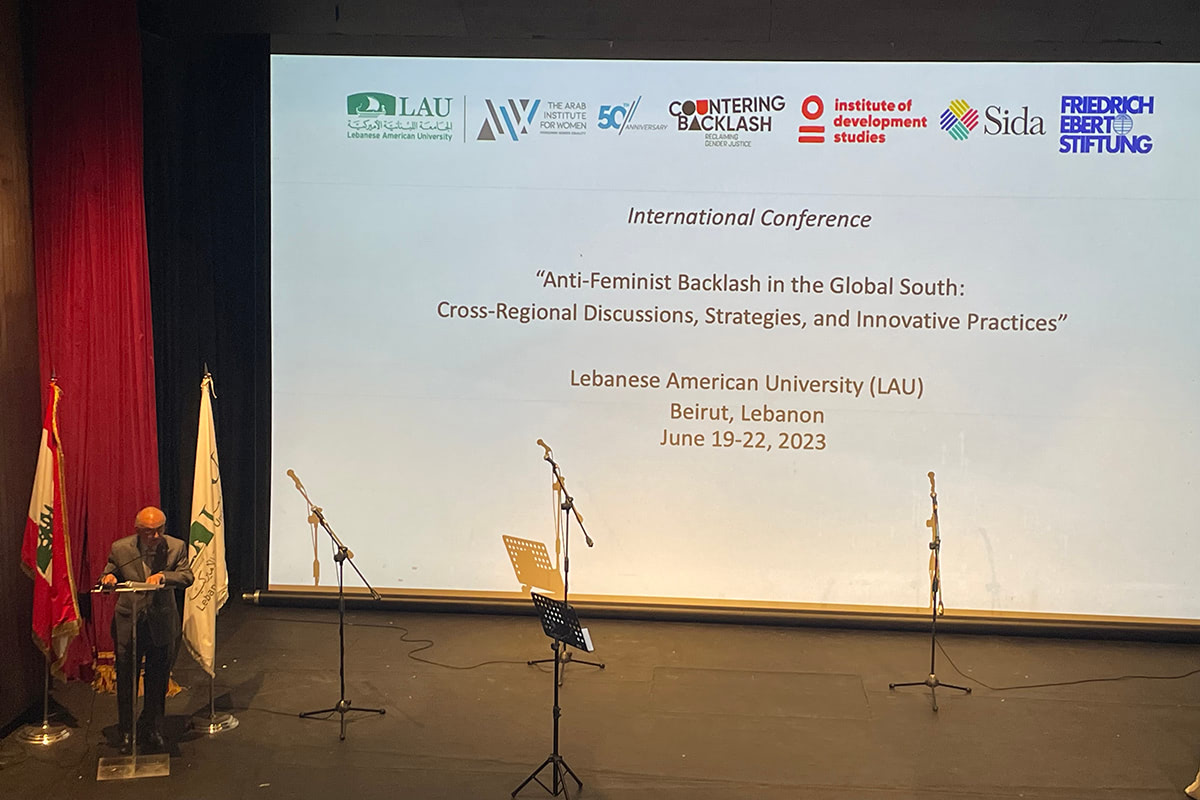Countering Anti-Feminist Backlash in the Global South One Conference at a Time
Thirty-three panelists from twelve countries convened to share the instances of backlash they have witnessed in their own spheres.
Any drive that seeks to implement social, economic, and political changes to already cemented societal structures is bound to face opposition one way or the other. Feminism is no exception; the movement that has resisted gender inequalities from the root up has been facing backlash that aims to derail and reverse its gains. With anti-feminist agendas growing stronger globally, the need for plans to counter this backlash becomes more urgent.
To that end, the Arab Institute for Women (AiW) at LAU in partnership with the Institute of Development Studies (IDS) hosted an international conference centered on producing and building knowledge on anti-feminist backlash, comparing and contrasting anti-feminist backlash strategies, and building cross-sectoral and transnational alliances among anti-backlash actors in the Global South.
Speakers from Turkey, Bangladesh, India, Serbia, Tunisia, Palestine, Jordan, Malaysia, Morocco, Iran, South Africa and Lebanon gathered at the Adnan Kassar School of Business on the Beirut campus from June 19 to 22. Over the course of three days, 10 panels addressed topics ranging from understanding power dynamics to exploring global and regional perspectives and discussed lessons learned.
One panel covered the Shaheen Bagh protests in New Delhi, India, where thousands of women proclaimed their outright rejection of the Citizen Amendment Act (CAA) and National Register of Citizens (NRC) acts that were in essence anti-Muslim. Another panel spotlighted the seemingly feminist organization KADEM in Turkey (The Women and Democracy Association in English) which, as the panelists discussed, advocates for patriarchal values and against feminist politics.
“The many institutions we have participating in this conference and the number of experts assembled can only be an indication of the global significance of the issue we are addressing,” remarked LAU President Michel E. Mawad at the opening ceremony.
Indeed, the conference was held as a part of a bigger project – “Countering the Backlash: Reclaiming Gender Justice” – a six-year program launched by IDS, in partnership with AiW, and funded by the Swedish International Development Cooperation Agency (Sida).
AiW Director Myriam Sfeir offered further context. “The project aims at creating the necessary knowledge and identifying opportunities for women’s rights organizations and gender justice advocates to counter the backlash and address the erosion of gender objectives within the development policy and practice spheres,” she said.
“The program is organized around three strands of work,” which IDS research fellow Jerker Edström identified as “the voice, patriarchy, and policy and practice.” The voice strand, he explained, is about the women’s movement, voice, and agenda, while the patriarchy strand analyzes masculinity critically – especially within backlash dynamics – and the policy and practice strand examines policy and civil spaces based on social change, power, and queer theory. Edström also noted that the AiW is the only partner working on all three strands at once.
The AiW has always been “timeless in its pursuit of gender equality and women empowerment in terms of creating awareness, conducting research, undertaking advocacy roles, and engaging on occasion in outright activism,” said Dr. Mawad.
Activist and member of AiW’s research team Nay El Rahi discussed the research undertaken within the project and highlighted the backlash within the Lebanese political system.
“We cannot talk about the backlash against women, women’s rights, or gender justice in Lebanon without first unpacking the oppressive structures that are built into the Lebanese sexist and sectarian political system, without looking at or discussing the structural flaws embedded in the very way our families, our societies, our communities and our states are constructed,” she argued, listing as examples personal status laws, passing on the citizenship and census registration, among others.
To further illustrate the timeliness of the topic, the AiW teamed up with Lina Abyad, former associate professor of theater at LAU, to produce a skit based on testimonials from Gender at Work in India and the RAAD Institute for Governance and Development in Bangladesh. Complimenting Abyad’s dedication to the movement, Sfeir noted how “she’s always ready to transform my ideas, however crazy they are, into drama and theater, with the hope of helping us voice the concerns and issues of women in any way she can.”
Despite the hurdles that prevent the achievement of true gender justice, Sfeir said, the fight for equality should never falter. “We all have a duty to fulfill, so let us not postpone it, so we can make sure to leave no one behind.”




